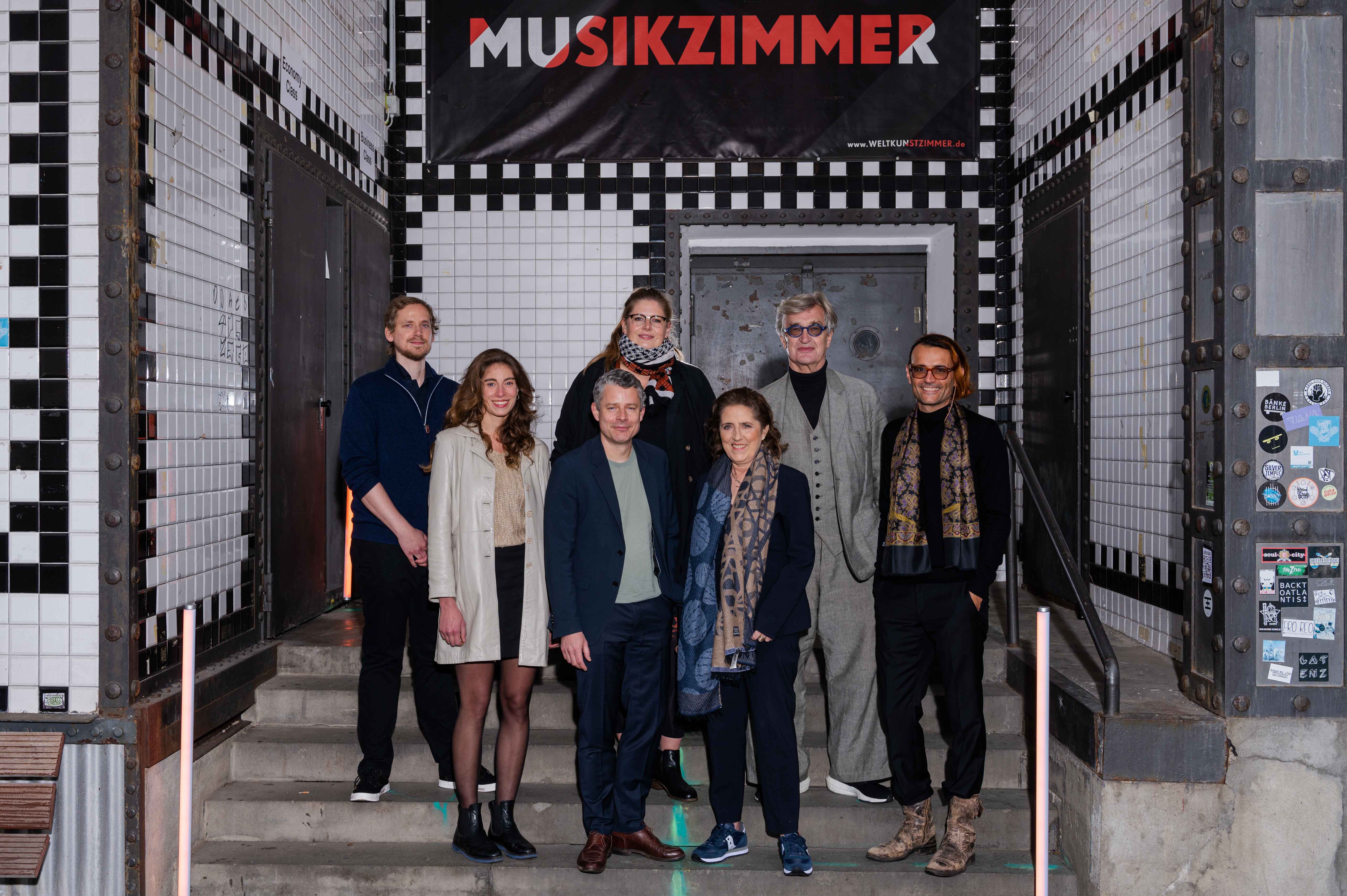For the eighth time, the Film- und Medienstiftung NRW and the Wim Wenders Foundation have jointly awarded the Wim Wenders Grant. The award ceremony took place in the Weltkunstzimmer in Düsseldorf-Flingern adhering to current hygiene regulations (2G rules). The renowned grant, which endows a total of around 100,000 euros annually, enables young filmmakers to independently develop their visions for innovative visual storytelling.
The jury, comprised of Petra Müller, Managing Director the Film- und Medienstiftung NRW, Mirko Derpmann, Creative Director of Scholz & Friends Agenda, and chairman Wim Wenders, selected five projects from a total of 38 applications. The deciding factors in their decision-making process were the quality of the material and a convincing visual concept.
Jury chairman Wim Wenders says, “The quality and complexity of the projects submitted particularly impressed us as a jury this year and left us more than usually spoilt for choice. The consistently innovative and powerful ideas prove that our scholarship has really come into its own in this, its eighth year. The annual colloquia with new and old scholarship holders, also show how much the Wim Wenders Grant helps them in the important phase of developing their material. Many of the funded projects have already made it to the big screen, which is wonderful. My congratulations go to this year’s scholarship holders, and I would like to thank all applicants for their trust!”
“Romeo and Juliet in a space station, a schoolgirl’s feminist report, the fictional biography of a software mogul, furniture which comes to life and a young footballer in search of his indigenous identity. This year, our applicants’ ideas were unusual and highly individual. Of the five filmmakers who received funding, two are from North Rhine-Westphalia, two from Berlin and one from Hesse. This year three of our recipients are women. We wish all grant recipients every success in developing their ideas,” says Petra Müller, Managing Director of the Film- und Medienstiftung NRW.
The selected projects 2021:
“The Schoolgirl Report” by Sylvia Borges
Feminist alternative to the successful 1970s film, 25,000 euros.
KHM graduate Sylvia Borges is working on a remake of the famous Schoolgirl Report, which was released in the early 1970s and is still one of the ten most successful German films. The difference: Borges does not cater to male fantasies; she tells real stories about young women’s sexuality. The structure and visual language evoke the original film but form an alternative feminist viewpoint.
“Hazy Valley” by Lea Schlude
A budding professional footballer in search of his indigenous identity, 25,000 euros.
Lea Schlude, who studied film and philosophy in Berlin, Hildesheim and in Belém, Brazil, follows in the footsteps of 17-year-old Joseph, a budding professional footballer with indigenous roots. Accompanied by his uncle Matt to the Ruhr Valley region, the talented player is far away from his home in Los Angeles for the first time, in order to concentrate fully on his footballing future. But the questions about his origins, his identity as a member of the Kizh Nation tribe, who are Los Angeles’ indigenous population, become more and more pressing. Gradually, Joseph becomes aware of the full extent of the cover-up of indigenous history in his hometown.
“I Am Your Light” by Quimu Casalprim.
The ups and downs of a living piece of furniture, 20,000 euros.
Zeus, who is lonely, takes his work as a living piece of furniture very seriously – regardless of whether he is in art galleries, sex clubs or with the rich photographer Wanda and her lover. Even when everything around him is falling apart, Zeus remains true to himself, unflinchingly performing his function, shining brightly. He is just an object, with skin, eyes, ears – and a heart. Filmmaker and media artist Quimu Casalprim graduated from the Academy of Media Arts in Cologne.
“My Name is Hase” by Jan Riesenbeck
Tragicomedy about the pioneer of fake news, 15,000 euros.
“My Name is Hase” tells the fictional life story of entrepreneur Viktor Hase (1972 – 2048), one of the most influential and controversial figures in German history. The technology freak develops revolutionary software, which enables the breeding ground for fakes and propaganda. Then he becomes a victim of his own technology. Jan Riesenbeck completed his film studies at the Academy of Media Arts in Kassel and works as a freelance author.
“Central Station” by Henrika Kull
An extraordinary encounter in a cyberpunk space station, 12,000 euros
In “Central Station” Henrika Kull, who studied production at the German Film and Television Academy, Berlin, and directing at the HFF Potsdam, tells of the impossible sci-fi love story between Eleni and Munir. Just like so many others, Eleni wants to run away from Earth, which has been completely destroyed. She wants to leave everything behind, her memories, her disappointment, her sadness, and her anger. On her last day on Earth, she meets Munir, who works as a steward in the space station. The two of them fall in love and shortly afterwards, lose each other. From then on, they cannot find their way back together, yet they will never forget each other. Kull’s graduation film “Jibril” premiered in the Panorama section at the Berlinale in 2018. She is currently on festival tour with her current film Glück/Bliss, which was shown this year at the Berlinale.
